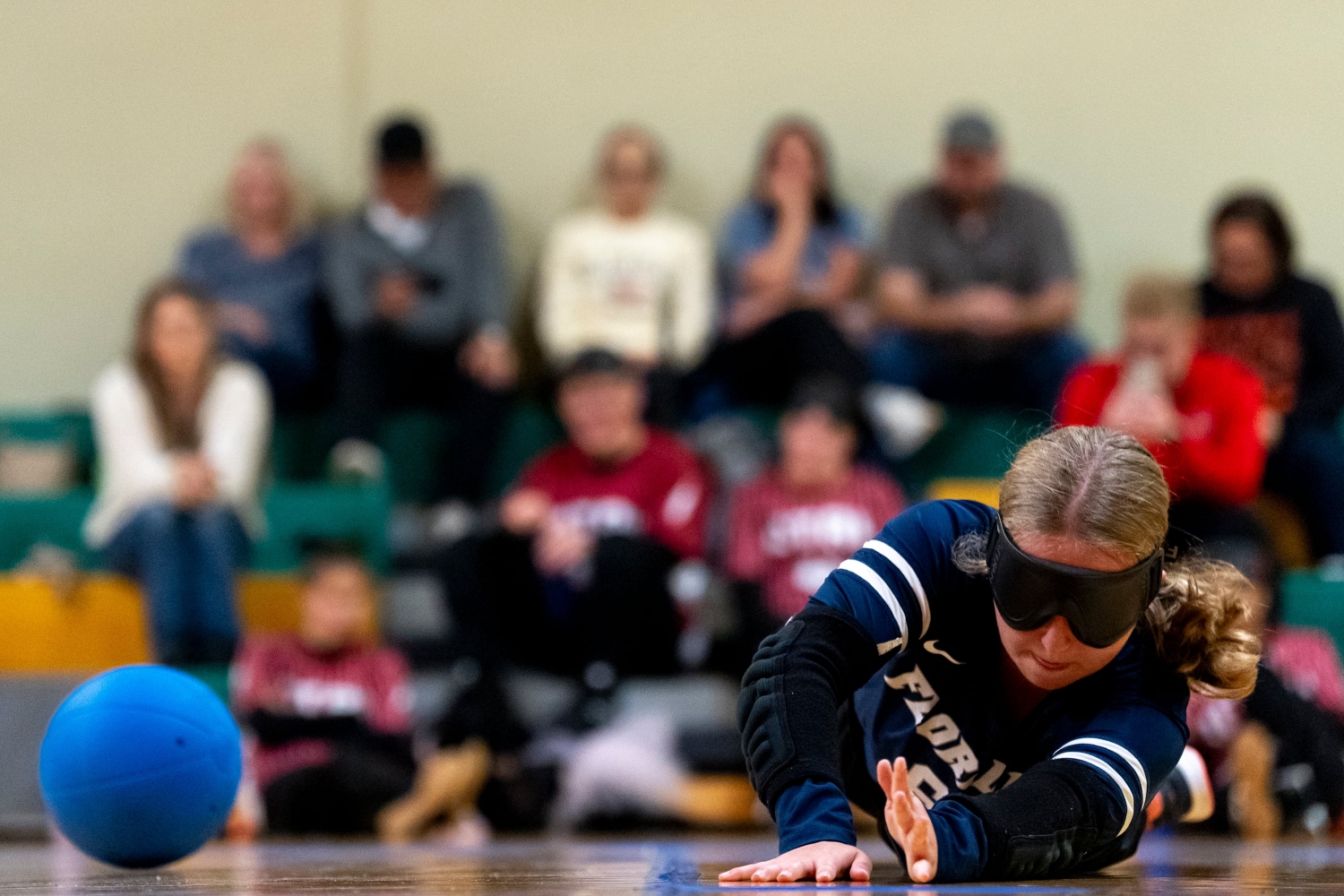

Published on: 11/17/2025
This news was posted by Oregon Today News
Description

With the squeal of a whistle and a call for quiet, players at the Washington State School for the Blind in Vancouver faced off in a silent gymnasium. They wore blacked-out goggles and crouched in an area the size of a volleyball court, ready to stop the ball from skittering past them into the net they were guarding.
The silence in the gym was part anticipation, part rules of the game. Any noise from audience members can distract blind players from hearing the ball and trying to stop it.
The game was one of many during the Junior Cascade Classic in early November, where teams competed in the only sport designed specifically for people who are blind or low vision. It was the setup before the team competes in the youth nationals in Texas in December.
“The ball is about the same size of a guy’s basketball, but no air pressure,” said Jen Armbruster, an organizer. “So, it’s about a 3 lb. medicine ball. At the higher levels, we’re throwing between 30-35 miles an hour on the women’s side and 35-40 miles an hour on the guys’ side.”
Armbruster lost her vision as a teenager. At the time, basketball had been her ticket to college.
“I was playing competitive basketball when I went legally blind,” she said, recalling how she heard about goalball after that moment. “It had ‘ball’ in it, so I said, ‘What the heck, let’s do it.’”
That was the start of Armbruster’s career as a seven-time Paralympian. She has won gold, silver and bronze medals. Now retired from the sport, she helps organize competitions like the Junior Cascade Classic.

Corey Grandstaff is the associate director of transition and residential programs at the Washington State School for the Blind. He started playing goalball in the early 2000s while attending the Ohio School for the Blind.
“There’s a lot of other sports that have been adapted for people who are blind, but this is a sport specifically made for people who are blind,” he said.
Teams visited the Vancouver campus from Utah, Montana, California and Florida. The atmosphere was light. Guide dogs sat with their owners in the bleachers, and players didn’t seem overly upset when their opponents scored. The Washington State School for the Blind Lions huddled in a circle, strategizing with their coaches.
“I have never really seen a sport out there that is about sound,” said Theo Burkhalter, a senior on the Lions team. “Everything is about spatial awareness.”
Players are alerted to the sound of the ball coming toward them by the small bell inside, jingling along at 30 miles an hour.
“I’m listening for footsteps, because sometimes players want to walk, switch around, try to confuse you,” said Jess Jinks, another player on the Vancouver women’s team.







When players throw the ball, bowling-style, across the court, their opponents must dive to the ground to block it.
Goal ball was created in 1946 as a form of rehabilitation for veterans who lost their sight during World War II, according to the International Paralympic Committee.
Another Lions team member, Owen Boe, played competitive football before going blind. At the time, he didn’t know blind sports existed.
“When I found out about goal ball, I was thrilled and I just fell in love with it,” he said.
At the tournament, Owen’s parents, Gabe and Karla Boe, watched from the bleachers.

“It is a different sport in that you have to be quiet when they play. We’re used to cheering and yelling,” Karla said. “But for Owen, it’s been great.” She said she appreciates that, like sports in public schools, students have to keep their grades up if they want to compete.
“We like that they’re not treated any differently,” she said. At the Vancouver school, Grandstaff said, goalball players get the chance to be active and to earn their spot on a team.
“You’re going to have to work hard to get what you get out of life, right? But life can throw you some disappointments,” he said. “So, you learn to lose. You learn to win, you learn to lose, you learn all these different skills that any athlete would learn.”
The men’s and women’s teams for the Washington State School for the Blind Lions both earned third place at the Junior Cascade Classic. They will compete in the National High School Goalball Championships in Austin, Texas, next month.
News Source : https://www.opb.org/article/2025/11/17/washington-school-blind-vision-paralympic-sport-goal-ball-vancouver/
Other Related News
11/17/2025
Heres where things stand on Trumps proposal for 2000 rebate checks and whod be eligible
11/17/2025
There are dozens of items up for bid in the John Olivers Junk auction and the props range ...
11/17/2025
The longest government shutdown in US history ended last Wednesday but many federal worker...
11/17/2025
Giant frogs continue to make a splash in local politics And US Rep Maxine Dexter isnt afra...
11/17/2025







